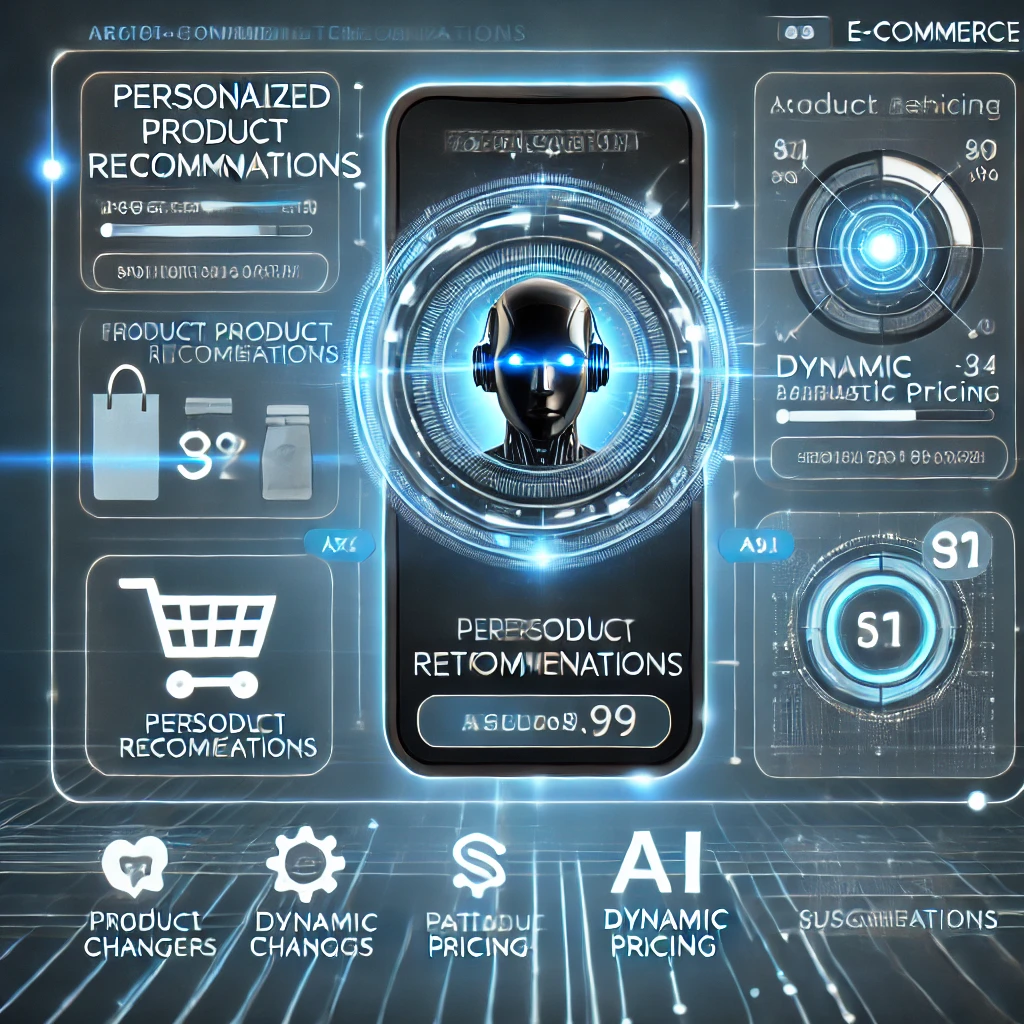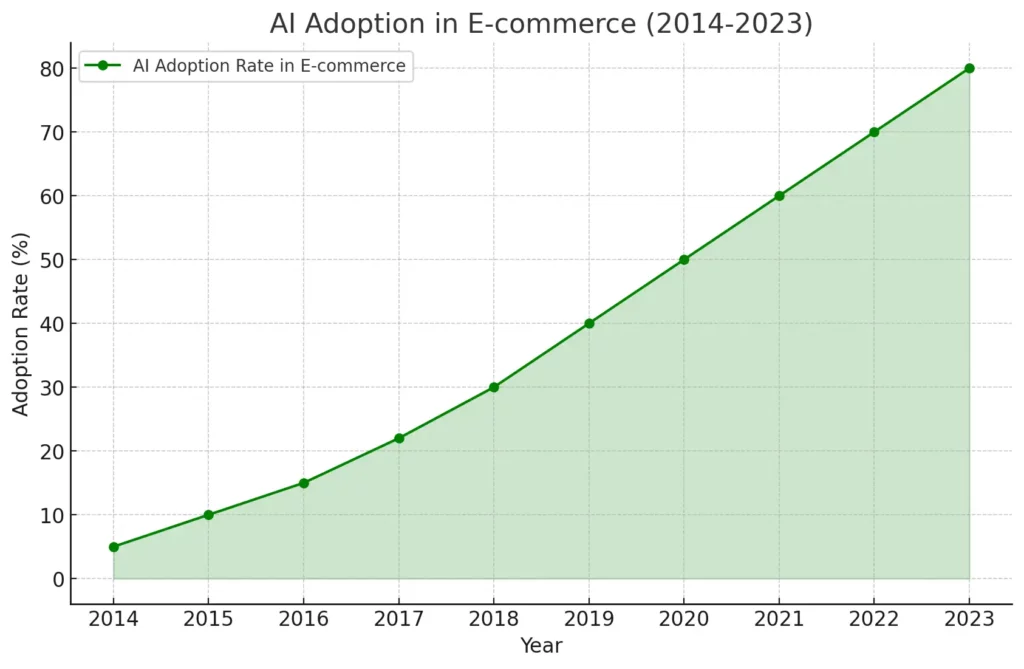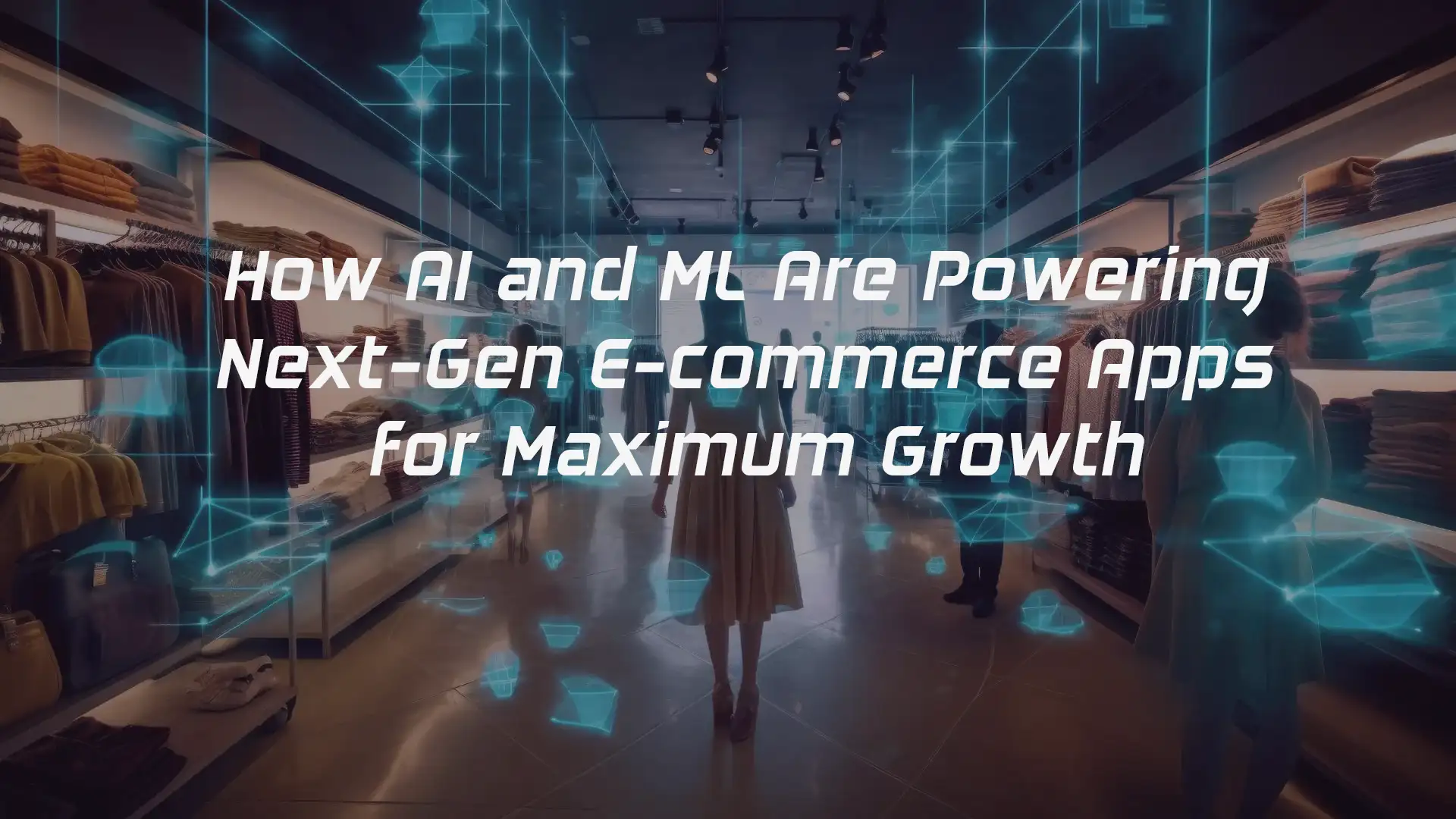The e-commerce industry has seen a remarkable transformation in recent years, with Artificial Intelligence (AI) and Machine Learning (ML) leading the charge. As more businesses move online, the need for smarter, more personalized shopping experiences has become critical. AI and ML are powering these advancements, driving customer engagement, improving efficiency, and maximizing growth potential.
In this blog, we’ll dive into how AI and ML are reshaping the e-commerce landscape, from personalized recommendations to automated customer service and fraud prevention. Whether you’re a developer or a business owner, understanding these technologies can provide a competitive edge in this fast-evolving market.
Why AI and ML Are Crucial for E-commerce Growth
AI and ML offer the potential to process and analyze vast amounts of data at a scale impossible for humans. For e-commerce businesses, this means better understanding of customer behavior, improving the user experience, and streamlining operations. Here’s why AI and ML have become indispensable in modern e-commerce:
- Personalized Shopping Experiences: AI-driven recommendation engines analyze customer data to suggest products based on individual preferences and browsing behavior. This level of personalization leads to higher conversion rates and increased customer satisfaction.
- Improved Customer Service: AI-powered chatbots and virtual assistants can handle customer inquiries 24/7, solving common issues without human intervention. This leads to faster response times and enhances customer loyalty.
- Fraud Detection and Security: ML algorithms can analyze transactions in real time to detect potentially fraudulent activities. This reduces the risk of fraud and builds trust with customers, especially in high-volume online stores.
- Operational Efficiency: AI can automate inventory management, pricing strategies, and supply chain optimization. This improves the overall efficiency of the business, helping to reduce costs while improving service levels.

Key AI and ML Applications in E-commerce
| AI/ML Application | Use Case | Benefits |
|---|---|---|
| Personalized Recommendations | Product suggestions based on behavior | Higher conversion rates, increased sales |
| AI-Powered Search Engines | Enhanced search accuracy and visual search | Improved user experience, faster product discovery |
| AI Chatbots/Virtual Assistants | 24/7 customer support | Increased customer satisfaction, lower costs |
| Dynamic Pricing | Real-time price optimization | Competitive pricing, maximized profits |
| Predictive Analytics for Inventory | Forecasting product demand | Reduced stockouts and overstock, better planning |
| Fraud Detection | Real-time fraud analysis | Reduced fraudulent transactions, increased security |
| Sentiment Analysis | Analyze customer feedback and opinions | Better marketing strategies, improved brand image |
Let’s take a closer look at how specific AI and ML applications are being utilized to push e-commerce apps to the next level.
1. Personalized Product Recommendations
One of the most common uses of AI and ML in e-commerce is personalized recommendations. These algorithms analyze browsing history, past purchases, and even real-time behavior to offer suggestions that are most likely to lead to a sale. Examples of this include:
- Amazon’s Recommendation Engine: Amazon uses AI to show customers products they’re likely to be interested in, leading to increased sales.
- Netflix-Style Personalization for E-commerce: Some e-commerce platforms are adopting content recommendation techniques similar to Netflix, where AI customizes the shopping experience for each individual customer.
2. AI-Powered Search Engines
E-commerce search engines powered by AI provide smarter and more intuitive search results. They can recognize synonyms, customer intent, and even visual input to deliver highly accurate results. Visual search engines, like those found on platforms such as Pinterest or ASOS, let customers upload images to find similar products.
3. AI-Enhanced Chatbots and Virtual Assistants
Customer service is critical in e-commerce, but it can be time-consuming and costly. AI chatbots provide 24/7 customer support, answering questions, helping with orders, and resolving complaints. Virtual assistants like Siri or Alexa can even place orders for users, creating seamless shopping experiences.
4. Machine Learning for Dynamic Pricing
ML models can analyze market conditions, competitor pricing, and customer demand in real-time to suggest optimal prices. This dynamic pricing strategy allows businesses to remain competitive while maximizing profits.
5. Predictive Analytics for Inventory Management
Inventory management is another area where AI and ML shine. Predictive analytics can forecast demand by analyzing seasonal trends, customer behavior, and historical data. This helps businesses maintain optimal inventory levels, reducing both stockouts and overstock situations.
6. Fraud Detection and Prevention
As e-commerce grows, so does the risk of fraud. ML models can analyze transactions in real time, identifying anomalies and suspicious behavior. This significantly reduces fraudulent activities like account takeovers, fake accounts, and payment fraud.
7. Sentiment Analysis for Marketing
AI-driven sentiment analysis tools help e-commerce brands understand customer opinions and feedback. By analyzing reviews, social media posts, and customer interactions, businesses can adjust their marketing strategies to better resonate with their audience.
Read Also : HealthifyMe Business Model Explained: How It Works and Generates Revenue

Market Trends for AI Adoption in E-commerce
1. Personalization
AI has enabled the creation of highly personalized shopping experiences, such as product recommendations and tailored marketing, which have become key features of leading e-commerce platforms. AI-based personalization is driving customer engagement, with more businesses adopting this technology every year.
2. Automation of Customer Support
The use of AI chatbots and virtual assistants has grown significantly. These tools provide instant support to customers, reduce wait times, and handle common inquiries, freeing human agents to deal with more complex issues.
3. Dynamic Pricing and Inventory Management
AI is being used to optimize pricing strategies and inventory management, allowing e-commerce businesses to respond in real-time to market changes and customer demand. This has led to significant increases in operational efficiency and revenue generation.
4. Fraud Detection
E-commerce platforms are increasingly using AI to monitor transactions and identify fraudulent activities, making it a vital part of maintaining trust and security in online shopping.
5. Voice and Visual Search
AI-powered search tools, including voice and image-based searches, are gaining traction. Customers can now search for products using images or voice commands, simplifying the shopping process.
Market Trends Chart for AI Adoption in E-commerce (2014-2023)
Let me generate the chart for the Adoption of AI in E-commerce over the last decade to visually represent these trends.
AI Adoption in E-commerce (2014-2023)

Here is the updated Market Trends Chart for the Adoption of AI in E-commerce (2014-2023). The chart illustrates a steady increase in the adoption of AI technologies in e-commerce platforms, showing the growing reliance on AI for personalization, automation, fraud detection, and operational efficiency.
This chart visually represents the significant rise in AI integration within the e-commerce industry over the past decade, highlighting the importance of AI as a key driver for modern e-commerce strategies.
Want to enhance your streaming platform with blockchain?
Improve privacy, reduce piracy, and optimize monetization.
Challenges of Implementing AI and ML in E-commerce
| Challenge | Description | Possible Solutions |
|---|---|---|
| Data Privacy and Security | Ensuring customer data privacy and complying with regulations (e.g., GDPR) | Implement strict data encryption, ensure compliance audits |
| Cost of AI Implementation | High upfront costs for developing and integrating AI solutions | Use cloud-based AI platforms, prioritize scalable AI tools |
| Technical Expertise | Lack of in-house AI/ML expertise to implement solutions | Partner with AI specialists, invest in upskilling the workforce |
While AI and ML offer immense potential, there are challenges in implementation:
- Data Privacy and Security: With vast amounts of customer data being analyzed, maintaining privacy and complying with regulations like GDPR is crucial.
- Cost of AI Implementation: AI solutions, particularly customized ones, can be expensive to implement, making them less accessible for smaller businesses.
- Technical Expertise: Deploying AI solutions often requires specialized technical knowledge, which may be a hurdle for businesses without in-house expertise.
Steps to Integrate AI & ML in E-commerce
Integrating AI and ML into an e-commerce platform can seem daunting, but following a structured approach will ensure a smooth transition and help you unlock the full potential of these technologies. Here’s how you can go about it:
1. Define Business Goals and Objectives
- Before jumping into AI/ML implementation, clearly define your business objectives. Whether it’s improving personalization, automating customer support, or optimizing inventory, having a well-defined goal will help in choosing the right AI/ML solutions.
- Example: If your goal is to enhance customer experience, focus on AI-powered recommendation engines and chatbots.
2. Collect and Organize Data
- AI and ML models rely heavily on data. Collect and structure data such as customer behaviors, transaction history, search queries, and purchasing patterns. Ensure your data is clean, organized, and stored in an accessible format.
- Example: Gather data on customer interactions, reviews, product preferences, and historical purchases to feed into a recommendation engine.
3. Choose AI/ML Tools and Platforms
- Select AI/ML tools that align with your business needs. You can opt for ready-made AI services like Google Cloud AI, AWS AI, or custom solutions developed by a partner like Miracuves. Your choice depends on your objectives, budget, and technical resources.
- Example: Use Google Cloud’s AI platform to build personalized shopping experiences or implement automated customer support using NLP models.
4. Build AI Models for Specific Use Cases
- Once you have chosen the platform, begin building AI models for specific use cases such as:
- Personalized Recommendations: Build ML models that analyze user preferences and recommend relevant products.
- Dynamic Pricing: Create models that adjust product prices based on market conditions and demand.
- Fraud Detection: Develop models that monitor transactions and flag suspicious activities.
- Inventory Management: Use predictive analytics models to forecast demand and manage stock effectively.
5. Integrate AI into E-commerce Platform
- Now, integrate the AI and ML models into your existing e-commerce platform. Most e-commerce platforms offer plugins or APIs that facilitate this integration. Test the integration thoroughly to ensure it works smoothly across the website and mobile apps.
- Example: Incorporate an AI chatbot into the website’s customer support system, or integrate the recommendation engine on product pages.
6. Monitor and Optimize
- AI models improve with time and data, but constant monitoring is required. Track their performance, gather feedback, and continuously optimize the algorithms for better results.
- Example: Monitor the conversion rates for AI-generated product recommendations and adjust the model for improved relevance.
7. Scale and Expand AI Capabilities
- As your business grows, expand AI capabilities to other areas like marketing automation, logistics optimization, and visual search. The key is to scale AI implementation as your data and business requirements grow.
- Example: Add visual search capabilities to help customers find products by uploading images, or use AI for marketing campaigns that target users based on their behavior.
How AI and ML Are Driving Future E-commerce Trends
| Trend | Description | Expected Impact |
|---|---|---|
| Voice Commerce | Using voice assistants for shopping | Easier, hands-free shopping, increase in voice-driven purchases |
| Hyper-Personalization | Tailored experiences based on contextual data like mood or location | Higher customer engagement, improved customer retention |
| Augmented Reality (AR) | Virtual product try-ons and visualizations in real-time | Reduced returns, enhanced customer satisfaction |
Looking ahead, AI and ML will continue to drive innovation in e-commerce. Some emerging trends include:
- Voice Commerce: As voice assistants become more sophisticated, voice shopping is expected to rise. Customers can use AI-powered virtual assistants to browse and purchase products without touching a device.
- AI-Driven Hyper-Personalization: In the future, AI will enable hyper-personalized shopping experiences that consider not only past purchases but also contextual data like the weather, location, and even mood.
- Augmented Reality (AR): AI-enhanced AR is already being used by companies like IKEA and Sephora, allowing customers to visualize products in their homes or try on makeup virtually.
Should We Add AI in E-commerce Web and App?
Adding AI to your e-commerce web and app is essential for staying competitive in today’s fast-evolving market. Here’s why:
- Enhanced Personalization:
- AI helps create personalized shopping experiences by analyzing user behavior, preferences, and purchase history. This can significantly boost customer engagement and sales by showing them products they’re more likely to buy.
- Example: AI recommendation engines suggest products based on past purchases or browsing habits, leading to higher conversion rates.
- 24/7 Customer Support with AI Chatbots:
- AI-powered chatbots can handle customer inquiries, process orders, and resolve complaints instantly, offering a seamless shopping experience. This reduces the load on human customer service representatives and improves response time.
- Example: AI chatbots can answer frequently asked questions, assist with product searches, and even provide order tracking information.
- Dynamic Pricing:
- AI enables dynamic pricing models by analyzing market demand, customer profiles, and competitors’ prices. This helps e-commerce platforms maximize profit while offering competitive pricing to customers.
- Example: E-commerce websites can automatically adjust product prices during peak shopping periods based on demand and competitor pricing.
- Fraud Detection:
- AI algorithms are highly effective at detecting fraud by identifying unusual patterns in transactions. This helps in securing payments and building customer trust, especially in high-volume stores.
- Example: Real-time monitoring can flag suspicious transactions and protect both the business and customers from fraud.
- Inventory Management:
- AI-powered inventory management can predict demand, optimize stock levels, and ensure that you always have the right products available without overstocking or running out of stock.
- Example: Retailers can use AI to forecast inventory needs based on sales patterns, seasonality, and customer trends.
How Will ML Drive Benefit in E-commerce?
Machine Learning (ML) brings significant benefits to e-commerce, driving smarter decisions and improving customer satisfaction. Here’s how ML can be advantageous:
- Predictive Analytics:
- ML algorithms analyze historical data to predict future trends, such as customer buying behavior, seasonal demand, or inventory requirements. This helps businesses make data-driven decisions that improve sales forecasting and product availability.
- Benefit: Reduces the chances of stockouts and overstocking, which leads to better inventory management.
- Improved Search Results:
- ML improves search functionality by learning from users’ search behavior and adjusting search results to provide more relevant suggestions. It enhances the user experience and helps customers find what they are looking for faster.
- Benefit: Increased customer satisfaction and reduced bounce rates as users quickly find the products they need.
- Customer Segmentation:
- ML models can segment customers into specific groups based on their behavior, allowing for more targeted marketing efforts. Businesses can send personalized offers, discounts, and promotions to specific customer segments.
- Benefit: Increases marketing efficiency, improves campaign effectiveness, and enhances customer retention.
- Dynamic Product Recommendations:
- ML algorithms use data from users’ interactions to suggest products in real time. This increases the likelihood of cross-selling and upselling by showing users relevant products throughout their shopping journey.
- Benefit: Drives higher average order values and customer loyalty through tailored recommendations.
- Price Optimization:
- ML algorithms can continuously monitor the market, competitors, and demand to optimize product prices in real time. This ensures that businesses offer competitive pricing without compromising profits.
- Benefit: Increases sales by offering the right price at the right time while maintaining margins.
- Fraud Detection and Security:
- ML models continuously learn from data and adapt to new fraudulent patterns. They can quickly detect anomalies and flag suspicious transactions, ensuring that fraud is minimized.
- Benefit: Reduces losses from fraudulent transactions and builds trust with customers.
Benefits and Revenue Increase of AI/ML in E-commerce
| Benefit | Description | Revenue Increase Impact |
|---|---|---|
| Personalized Recommendations | Tailoring product suggestions to users based on browsing and purchase history. | Up to 30% increase in conversion rates due to personalized shopping. |
| Dynamic Pricing | Real-time price adjustments based on demand, competition, and customer behavior. | Revenue growth through optimized pricing strategies (10-15% increase). |
| Chatbots and Virtual Assistants | 24/7 customer service, reducing support costs and increasing satisfaction. | Reduced support costs by 20%, boosting profits by improving customer retention. |
| Inventory Management | Predictive analytics helps optimize stock levels, reducing wastage. | 15-20% reduction in holding costs, improving operational efficiency. |
| Fraud Detection | AI models monitor transactions to detect and prevent fraud in real-time. | Minimizes losses from fraudulent activities, protecting profit margins. |
How Miracuves Can Help
As the adoption of AI and ML continues to rise in the e-commerce industry, businesses must keep up with these advancements to remain competitive. Miracuves offers expert AI and ML solutions tailored specifically to e-commerce platforms, helping businesses implement personalized recommendations, optimize inventory management, enhance customer service, and increase overall operational efficiency. With our cutting-edge technology and deep industry expertise, Miracuves empowers e-commerce businesses to harness the full potential of AI for maximum growth and profitability.
At Miracuves, we provide tailored AI and ML solutions designed to integrate seamlessly with e-commerce platforms. Whether it’s building customized recommendation engines, implementing AI-powered customer support, or optimizing backend operations, we ensure a smooth integration process with guaranteed results.
By following these steps, your e-commerce business can effectively integrate AI and ML technologies, driving better customer experiences and operational efficiency.
Conclusion: Embracing AI and ML for E-commerce Success
AI and ML are no longer futuristic technologies; they are essential tools for driving growth in the e-commerce sector. By offering personalized experiences, enhancing operational efficiency, and safeguarding transactions, these technologies can help businesses thrive in an increasingly competitive landscape.
For e-commerce companies looking to stay ahead, now is the time to integrate AI and ML solutions into their platforms. Whether it’s personalized recommendations, smart search engines, or predictive analytics, the potential for growth is enormous.
Ready to Harness the Power of AI and ML?
At Miracuves Solutions, we specialize in building next-gen e-commerce apps powered by cutting-edge AI and ML technologies. Contact us today to learn how we can help you implement these innovations and unlock your business’s full potential.
Want to optimize your streaming platform with blockchain?
Enhance scalability, security, and efficiency.
FAQ
How is AI used in e-commerce to improve customer experience?
AI enhances the customer experience in e-commerce by providing personalized product recommendations, optimizing search results, enabling chatbots for 24/7 support, and offering dynamic pricing based on user behavior. These improvements result in higher customer satisfaction and engagement, driving more sales with the help of AI in e-commerce.
What are the benefits of machine learning for e-commerce businesses?
Machine learning helps e-commerce businesses by analyzing customer data to predict trends, optimize pricing strategies, improve product recommendations, and streamline inventory management. It also detects fraudulent transactions in real-time, enhancing overall security and profitability.
How can AI-powered recommendation engines boost e-commerce sales?
AI-powered recommendation engines analyze customer behavior, purchase history, and browsing patterns to suggest relevant products. This personalized shopping experience increases the likelihood of a sale, enhances customer satisfaction, and can lead to a 30-50% boost in conversion rates.
What is dynamic pricing in e-commerce, and how does AI facilitate it?
Dynamic pricing in e-commerce refers to adjusting product prices based on factors like demand, competition, and customer behavior. AI facilitates dynamic pricing by analyzing real-time data and automating price adjustments, ensuring businesses remain competitive while maximizing profits.
How do AI and ML help in optimizing inventory management for e-commerce?
AI and ML analyze historical sales data, seasonal trends, and customer behavior to forecast demand, ensuring the right products are available at the right time. This leads to reduced stockouts, optimized inventory levels, and minimized storage costs, improving overall operational efficiency.
What are the key AI tools used for e-commerce app development?
Popular AI tools for e-commerce app development include Google’s Cloud AI, AWS AI, and TensorFlow for building recommendation engines, customer support chatbots, and predictive analytics models. These tools help e-commerce platforms optimize user experiences, automate tasks, and drive business growth.








